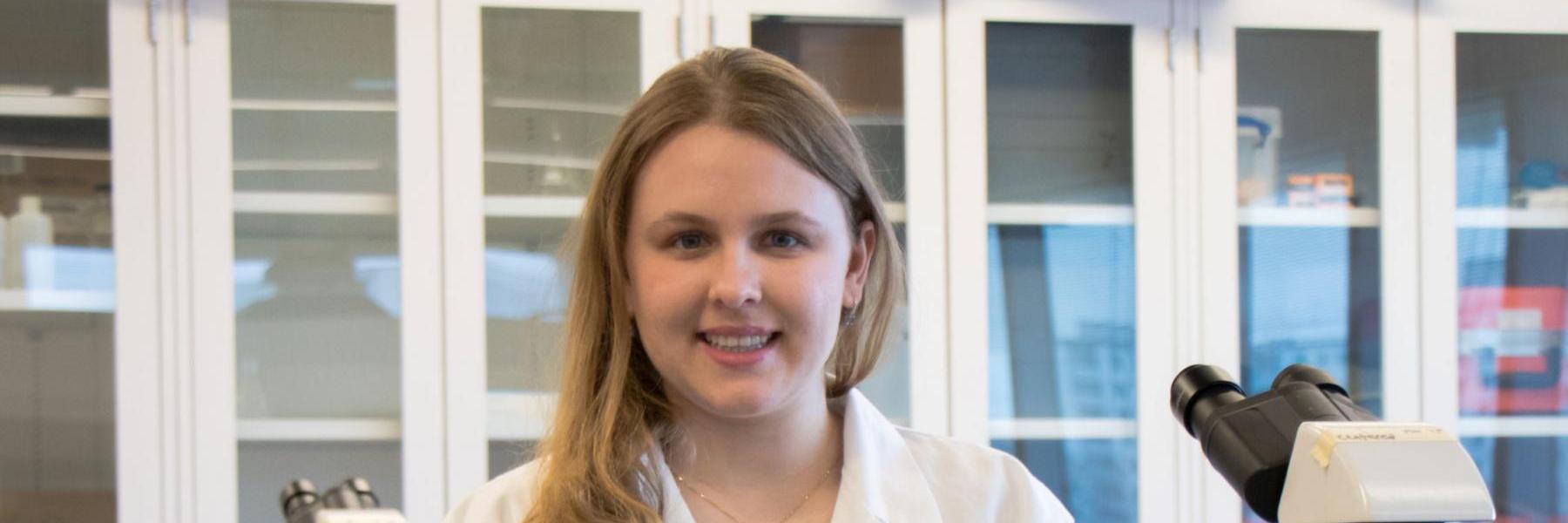Oleksandra Kaskun
Molecular Biology & Biotechnology
Recipient of competitive Studentship award, Oleksandra Kaskun, shares the value of merging co-op with research grants.
Worked at: The Hospital for Sick Children
The first time that Oleksandra Kaskun observed a surgery as an undergraduate researcher at the Hospital for Sick Children, she almost fainted. In addition to the first-time queasy feeling of observing the operation itself, she was required to wear a deceivingly heavy lead-weighted x-ray apron. “I went in feeling really confident. I picked the heaviest one because it looked fashionably attractive… and I almost fainted.” she laughs, recounting the memory.
In 2017, Oleksandra was one of five undergraduate students across Canada to be awarded a Studentship Research Scholarship worth $10,000 through the Brain Foundation of Canada. This led her to complete her co-op work terms as a researcher at The Hospital for Sick Children for two consecutive summers, concentrating her research on glioblastoma and chemotherapy resistance.
Through her position, she got to work on the front lines studying cancer and getting to observe surgeries was an integral part of the process. Despite the comical initial episode of nearly-fainting as she described, coming out of those surgery experiences left her wanting more.
“I was really interested with the patient interactions that I learned from that. I learned that it’s not just the surgery; that there are more aspects of being a surgeon or a physician. It gave me perspective on the work in the labs at SickKids and seeing this more patient-driven aspect inspired me even further to pursue being a physician. So, I was just like ‘I really want to do this’”.
Growth between work terms
Oleksandra’s studentship research position was divided over the course of two consecutive summer terms. Attending school between the two work terms, she explained, allowed her to pick up her research in the second year with new ideas and a fresh approach.
“I grew a lot between my first work term and the second; that’s why I really enjoyed the eight months in between. I feel like if I didn’t have the study term, I wouldn’t have had the same experience. I wouldn’t have grown as much and wouldn’t have had new knowledge to apply.
When I went back to research, I could use some of those ideas. I got more out of the presentations given by speakers at SickKids after I came back. I started to see research from a different angle, looking to see if it could fit with what I was researching at that point.”
Connecting classroom knowledge to lab work
The collaboration and integration of her courses back in the classroom allowed Oleksandra to build her foundational knowledge, boosting her confidence in the lab. She notes that the courses in molecular biology and immunology helped her understand other peoples’ projects while her microscopy course prepped her to understanding the use of microscopes and cells.
The biochemistry laboratory courses she took gave her confidence in tackling loaded research papers:
“We had to write a lot of research reports in that class, so that taught me how to get a lot more familiar with reading research papers,” which became a skill she later employed during her second work term.
Scholarship grants: an overlooked treasure trove
Reflecting upon her successfully completed co-op work terms, she shares her biggest advice to incoming students: take advantage of scholarship opportunities.
“I would really suggest trying to apply for some kind of scholarship for your work-term because I feel that a lot of people don’t know that it’s an option. I remember I only found out about this option when I attended a co-op workshop before my first work term and there were only 10 people there.
I remember they said that no one from UTSC had ever received the Brain Tumor scholarship. I applied anyways.
No matter what, your first work term is going to be a great boost to your morale and your resume, but if you can do your work term as a scholarship, it’s even better: it’s extra money for you and your employer, and it’s a key highlight on your application because you’ve been selected from an extra-competitive pool.”
Getting support from the co-op program
Oleksandra recommends students to seek help with applying for co-op and for studentships.
“Don’t do it alone and know who to go to! Have someone who can help you go through your application. I had people from the co-op office look over my application including Maryam Irshad, the business developer who specializes in the healthcare industry. She was really helpful.”
A big pay-off for the future
The ambitious student has plans for medical school and has applied to the University of Toronto among other schools. She has also published a final report and a research poster on the brain tumour website and has a joint-authored research paper currently under revision. It’s easy to see why her research experience coupled with the prestigious studentship award gives her a boost in confidence in her applications.
“Med school was an intense application, but I think that winning the brain tumour award and my research experience at SickKids was a big contribution. It makes applying for other opportunities feel more attainable because I didn’t think I was going to get the studentship. So, my thinking is: if I got the studentship, then maybe I will get into med school too.
I know that it is not an easy path that lies ahead for me. It will take a lot of hard work, but I know that the hard work will pay off!”

